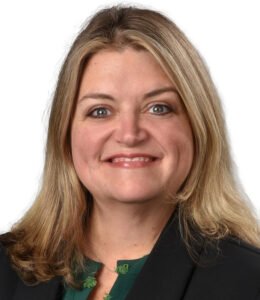By Stefan Yablonski

In April, SUNY Oswego’s School of Business announced the appointment of Maureen Melville as the inaugural director of the Center for Business Excellence and Transformation.
The Center for Business Excellence and Transformation is a new campus hub for experiential learning, innovation and community partnership.
A dynamic educator, business leader and connector, Melville brings more than a decade of industry experience and a strong record of student mentorship, strategic partnership development and program creation to the role.
She will lead a multifaceted initiative focused on talent pipeline development, student engagement, applied research and regional economic growth. CBET’s programming includes NSF-funded innovation, nonprofit internships through the Shineman Grant, a forthcoming student-run consulting agency and the only Sales Center in the SUNY system.
On her appointment, Melville said, “As the director of the Center for Business Excellence and Transformation, I see an incredible opportunity to not only elevate student career readiness but also strengthen our connections with the local and regional business community. By fostering collaboration between students, faculty and industry leaders, we can drive meaningful economic and professional growth for everyone involved.”
“We are hoping to lift our new Center for Business Excellence and Transformation. How do we make sure that the students are ready to be lifted to careers that they know how to talk about it,” said Kristen Eichhorn, dean of graduate studies at SUNY Oswego and the interim dean of the School of Business. “There is a lot that I think the center can offer students. We are looking to build out space for simulation labs.
“How is higher ed dealing with AI? How are we responding to that technology and those changes? It’s going to be a multi-stage approach, trying to figure out how to work with it, how it changes the dynamic of what we are doing. I think the simulation lab is one answer.”
It used to be you read, you have an exam; write out all these essays in the blue books, she said.
“Now we have to think differently about how we are assessing skill sets. We’ll do it through simulations with case settings in real time. What we are envisioning is these lab spaces where we create scenarios where students react in real time about how to deal with a difficult situation. How are we going to hire this person? What questions are you going to ask? What are the follow-up questions you’re going to ask? You can imagine all the different scenarios across all the different majors and minors that students can come up with.”
All the labs will be tricked out with live streaming cameras that the students can’t really see. But there will be debriefing sessions where students can debrief with their peers, get feedback from faculty. That is more like an honest assessment of how they build their skill sets from the beginning of the year to the end of the year — to demonstrate some of the value of the course, according to Eichhorn.
Everything from marketing to sales pitches, even firing will be covered.
“Firing can be difficult. Having to work through that language and reaction in real time — these are the types of things we have to mock out for students so it won’t be the first time that they have had to think through a situation like this. So I think those sorts of things will be important,” she said.




